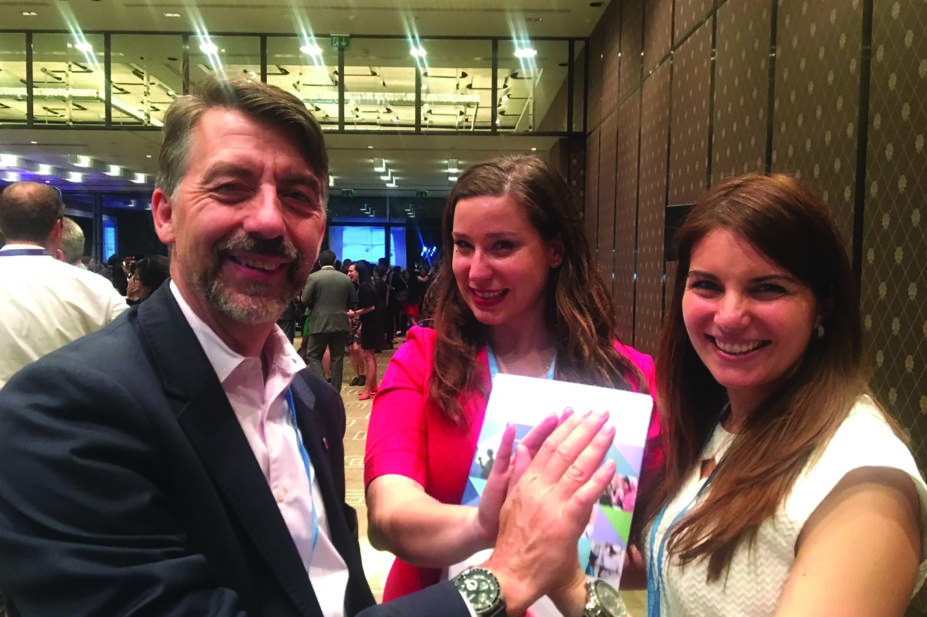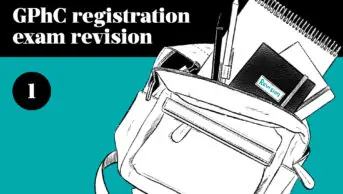
Courtesy, Ian Bates
Delegates from the Commonwealth Pharmacists Association (CPA) and the International Pharmaceutical Federation (FIP) represented the international pharmaceutical community at the 70th World Health Assembly (WHA), held in Geneva between 22 and 31 May 2017.
Chairing a session entitled ‘The Role of the Next Generation Addressing Non Communicable Diseases (NCDs)’, Oksana Pyzik, teaching fellow at UCL and representative of the CPA, asked delegates to think about best practice in tackling NCDs across sectors, and to consider how young people can make a direct impact on healthcare policy. The session was co-hosted by the CPA, the Commonwealth Youth Health Network and the Commonwealth Youth Sport for Development, and was the only pharmacy-led side event at the assembly.
Opening the session, Pyzik pointed out that “53 million annual deaths worldwide [are] caused by non-communicable diseases”, and that many of these affect younger people: “One third of young people globally are prescribed medications for long-term chronic conditions, and this number is growing — asthma, depression, juvenile diabetes, juvenile arthritis.”
Also on the panel was Raymond Anderson, president of the CPA, who highlighted the influence pharmacists have in managing such conditions. “There’s strong evidence to show pharmacy consultations improve adherence and management of NCDs”, he said, but added: “There needs to be a buy-in from government, to see the value of what we can do … Pharmacies have always been seen as simply supplying medicines. But the profession is changing, and becoming more focused on health outcomes and supporting people with their medication and health needs.”
Joining Pyzik and Anderson on the panel were Bente Mikkelsen, head of the secretariat for the World Health Organization (WHO) Global Coordination Mechanism on the Prevention and Control of NCDs, and the UN Interagency Task Force on Noncommunicable Diseases; Kibachio Joseph, head of the division of non-communicable diseases at the WHO; and Marie Hauerslev of the International Federation of Medical Students Associations. “Pharmacy is often under-represented by comparison with other healthcare organisations at the WHA,” Pyzik said after the event, “so it was a big moment for pharmacy to co-host a side event and put the work of pharmacists on the map.”
Also speaking at the assembly was Ian Bates, professor of pharmacy education at the School of Pharmacy, University College London, fellow of the RPS and education adviser to the English Pharmacy Board. Bates spoke on behalf of the FIP, for whom he is director for education development.
Pharmacists’ expertise in medicines (including vaccines) is crucial to achieving universal health coverage by 2030
At a side event called ‘Promoting intersectoral and coordinated actions to further invest in health and social workforce: towards achieving the 2030 Agenda’, held on 24 May 2017, Bates said that pharmacists’ expertise in medicines (including vaccines) was crucial to achieving universal health coverage by 2030 — described by the WHO as the most significant of the Sustainable Development Goals.
“In the 2012 FIP Centennial Declaration, pharmacists and pharmaceutical scientists accepted responsibility and accountability for improving global health and patient outcomes by improving the development, distribution and responsible use of medicines,” Bates said. “Achieving this goal requires a workforce of pharmacists and pharmaceutical scientists who are sufficient in number and are competent to deliver the full range of pharmaceutical services and to meet the challenges facing global health care.”
Bates went on to outline what the FIP, with the UCL-FIP Collaborating Centre, had already done towards meeting the challenge, including hosting a global event in Nanjing, China, on 7–8 November 2016 at which 13 Pharmaceutical Workforce Development Goals were launched. These goals, said Bates, are aligned to the five-year action plan on Health Employment and Economic Growth developed by WHO, the International Labour Organization and the Organisation for Economic Co-operation and Development. With these goals, the FIP aims to help create global professional standards for pharmacy education and practice.
The world needs more medicines experts — pharmacists, pharmacy support workers and pharmaceutical scientists
Moving on to current and future activities of the FIP, Bates highlighted a number of initiatives including the forthcoming establishment of a research and evaluation strategy, which will monitor the impact of pharmacists and pharmaceutical scientists.
“Medicines are important and ubiquitous,” Bates concluded. “They are also highly complex and expensive interventions. The world needs more medicines experts — pharmacists, pharmacy support workers and pharmaceutical scientists. It is imperative that we have a global agreement on how this important and critical workforce can be effectively developed to meet future national needs.”
You may also be interested in

Pharmacy regulator considers giving up legal authority to conduct covert investigations of pharmacists

More than 40% of people with ADHD waiting at least two years to access mental health service, study finds
